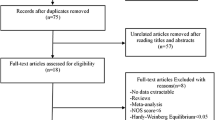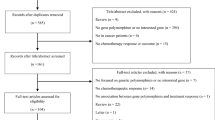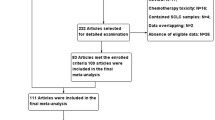Abstract
A possible association between multiple drug resistance 1 gene (MDR1) polymorphisms and the risk of developing hepatocellular carcinoma (HCC) is currently under debate, and evidence from various epidemiological studies has yielded controversial results. To derive a more precise estimation of the association between MDR1 polymorphisms and HCC risk, the present meta-analysis was performed. A total of 8 studies containing 11 cohorts with 4407 cases and 4436 controls were included by systematic literature search of EMBASE, PubMed, Web of Science, and CNKI. All polymorphisms were classified as mutant/wild-type alleles. In particular, the variation type, functional impact, and protein domain location of the polymorphisms were assessed and used as stratified indicators. The pooled odds ratio (OR) with 95 % confidence interval (CI) was calculated to evaluate the association. Overall, our results suggested that the mutant alleles of the MDR1 gene were associated with a significantly increased risk for HCC under all genetic models (allelic model: OR = 1.28, 95 % CI = 1.20–1.36, P < 0.001; dominant model: OR = 1.27, 95 % CI = 1.16–1.38, P < 0.001; recessive model: OR = 1.59, 95 % CI = 1.36–1.85, P < 0.001). Furthermore, increased risks for HCC were also revealed in stratified analyses by ethnicity, sample size, and quality scores of cohorts as well as variation type, functional impact, and protein domain location of polymorphisms. In conclusion, the present meta-analysis suggested that the presence of MDR1 mutant alleles might be a risk factor for HCC.


Similar content being viewed by others
References
Forner A, Llovet JM, Bruix J. Hepatocellular carcinoma. Lancet. 2012;379(9822):1245–55. doi:10.1016/S0140-6736(11)61347-0.
Siegel R, Ma J, Zou Z, Jemal A. Cancer statistics, 2014. CA Cancer J Clin. 2014;64(1):9–29. doi:10.3322/caac.21208.
El-Serag HB, Rudolph KL. Hepatocellular carcinoma: epidemiology and molecular carcinogenesis. Gastroenterology. 2007;132(7):2557–76. doi:10.1053/j.gastro.2007.04.061.
Shepard CW, Finelli L, Alter MJ. Global epidemiology of hepatitis C virus infection. Lancet Infect Dis. 2005;5(9):558–67. doi:10.1016/S1473-3099(05)70216-4.
Tanaka M, Katayama F, Kato H, Tanaka H, Wang J, et al. Hepatitis B and C virus infection and hepatocellular carcinoma in China: a review of epidemiology and control measures. J Epidemiol. 2011;21(6):401–16.
Wang ZC, Gao Q, Shi JY, Yang LX, Zhou J, et al. Genetic polymorphism of the kinesin-like protein KIF1B gene and the risk of hepatocellular carcinoma. PLoS One. 2013;8(4):e62571. doi:10.1371/journal.pone.0062571.
Dragani TA. Risk of HCC: genetic heterogeneity and complex genetics. J Hepatol. 2010;52(2):252–7. doi:10.1016/j.jhep.2009.11.015.
Jiang DK, Sun J, Cao G, Liu Y, Lin D, et al. Genetic variants in STAT4 and HLA-DQ genes confer risk of hepatitis B virus-related hepatocellular carcinoma. Nat Genet. 2013;45(1):72–5. doi:10.1038/ng.2483.
Park EJ, Lee JH, Yu GY, He G, Ali SR, et al. Dietary and genetic obesity promote liver inflammation and tumorigenesis by enhancing IL-6 and TNF expression. Cell. 2010;140(2):197–208. doi:10.1016/j.cell.2009.12.052.
Sun B, Karin M. Obesity, inflammation, and liver cancer. J Hepatol. 2012;56(3):704–13. doi:10.1016/j.jhep.2011.09.020.
Aleksandrova K, Boeing H, Nothlings U, Jenab M, Fedirko V, et al. Inflammatory and metabolic biomarkers and risk of liver and biliary tract cancer. Hepatology. 2014. doi:10.1002/hep.27016.
Borst P, Elferink RO. Mammalian ABC transporters in health and disease. Annu Rev Biochem. 2002;71:537–92. doi:10.1146/annurev.biochem.71.102301.093055.
Szakacs G, Varadi A, Ozvegy-Laczka C, Sarkadi B. The role of ABC transporters in drug absorption, distribution, metabolism, excretion and toxicity (ADME-Tox). Drug Discov Today. 2008;13(9-10):379–93. doi:10.1016/j.drudis.2007.12.010.
Ros JE, Libbrecht L, Geuken M, Jansen PL, Roskams TA. High expression of MDR1, MRP1, and MRP3 in the hepatic progenitor cell compartment and hepatocytes in severe human liver disease. J Pathol. 2003;200(5):553–60. doi:10.1002/path.1379.
Ernest S, Rajaraman S, Megyesi J, Bello-Reuss EN. Expression of MDR1 (multidrug resistance) gene and its protein in normal human kidney. Nephron. 1997;77(3):284–9.
Marchi N, Hallene KL, Kight KM, Cucullo L, Moddel G, et al. Significance of MDR1 and multiple drug resistance in refractory human epileptic brain. BMC Med. 2004;2:37. doi:10.1186/1741-7015-2-37.
Enokida H, Shiina H, Igawa M, Ogishima T, Kawakami T, et al. CpG hypermethylation of MDR1 gene contributes to the pathogenesis and progression of human prostate cancer. Cancer Res. 2004;64(17):5956–62. doi:10.1158/0008-5472.CAN-04-0081.
Schaich M, Ritter M, Illmer T, Lisske P, Thiede C, et al. Mutations in ras proto-oncogenes are associated with lower mdr1 gene expression in adult acute myeloid leukaemia. Br J Haematol. 2001;112(2):300–7.
Batetta B, Mulas MF, Petruzzo P, Putzolu M, Bonatesta RR, et al. Opposite pattern of MDR1 and caveolin-1 gene expression in human atherosclerotic lesions and proliferating human smooth muscle cells. Cell Mol Life Sci. 2001;58(8):1113–20.
Jamroziak K, Mlynarski W, Balcerczak E, Mistygacz M, Trelinska J, et al. Functional C3435T polymorphism of MDR1 gene: an impact on genetic susceptibility and clinical outcome of childhood acute lymphoblastic leukemia. Eur J Haematol. 2004;72(5):314–21. doi:10.1111/j.1600-0609.2004.00228.x.
Kurzawski M, Drozdzik M, Suchy J, Kurzawski G, Bialecka M, et al. Polymorphism in the P-glycoprotein drug transporter MDR1 gene in colon cancer patients. Eur J Clin Pharmacol. 2005;61(5-6):389–94. doi:10.1007/s00228-005-0926-5.
Leonessa F, Clarke R. ATP binding cassette transporters and drug resistance in breast cancer. Endocr Relat Cancer. 2003;10(1):43–73.
Sohn JW, Lee SY, Lee SJ, Kim EJ, Cha SI, et al. MDR1 polymorphisms predict the response to etoposide-cisplatin combination chemotherapy in small cell lung cancer. Jpn J Clin Oncol. 2006;36(3):137–41. doi:10.1093/jjco/hyi231.
Taniguchi S, Mochida Y, Uchiumi T, Tahira T, Hayashi K, et al. Genetic polymorphism at the 5′ regulatory region of multidrug resistance 1 (MDR1) and its association with interindividual variation of expression level in the colon. Mol Cancer Ther. 2003;2(12):1351–9.
Wu L, Xu X, Shen J, Xie H, Yu S, et al. MDR1 gene polymorphisms and risk of recurrence in patients with hepatocellular carcinoma after liver transplantation. J Surg Oncol. 2007;96(1):62–8. doi:10.1002/jso.20774.
Yu X, Xie H, Wei B, Zhang M, Wang W, et al. Association of MDR1 gene SNPs and haplotypes with the tacrolimus dose requirements in Han Chinese liver transplant recipients. PLoS One. 2011;6(11):e25933. doi:10.1371/journal.pone.0025933.
Marzolini C, Paus E, Buclin T, Kim RB. Polymorphisms in human MDR1 (P-glycoprotein): recent advances and clinical relevance. Clin Pharmacol Ther. 2004;75(1):13–33. doi:10.1016/j.clpt.2003.09.012.
Ambudkar SV, Kimchi-Sarfaty C, Sauna ZE, Gottesman MM. P-glycoprotein: from genomics to mechanism. Oncogene. 2003;22(47):7468–85. doi:10.1038/sj.onc.1206948.
Chen Y-D, Yang F, Feng S-T, et al. A case-control study on the association between genetic polymorphisms of MDR1 and hepatic cell cancer susceptibility. Chin Clin Oncol. 2009;14(12):1007–81.
Fukuda MKY, Hirota T, et al. Genetic polymorphisms of hepatic ABC-transporter in patients with hepatocellular carcinoma. JCT. 2010;1:114–23.
Ren YQ, Han JQ, Cao JB, Li SX, Fan GR. Association of MDR1 gene polymorphisms with susceptibility to hepatocellular carcinoma in the Chinese population. Asian Pac J Cancer Prev. 2012;13(11):5451–4.
Gao J. Association of MDR1 gene polymorphisms with the risk of hepatocellular carcinoma in the Chinese Han population. Braz J Med Biol Res. 2013;46(3):311–7.
Jing Rui DX, Deng W, et al. Correlation between MDR1 polymorphism and primary liver cancer in Guangxi. Chin J Oncol Prev Treat. 2013;5(2):122–5.
Yang D, Zhou F, Wang X, Gao H, Li G, et al. Association analysis between MDR1 gene polymorphisms and risk of hepatocellular carcinoma in Chinese population. Biomarkers. 2013;18(3):236–41. doi:10.3109/1354750X.2013.773079.
Li XF, He HB, Zhu YS, He JK, Ye WW, et al. Association between the c.3751G > a genetic variant of MDR1 and hepatocellular carcinoma risk in a Chinese Han population. Asian Pac J Cancer Prev. 2013;14(9):5361–5.
Wan YY, Wang XW, Hui HX, Wan L. Association between the c.1564A > T genetic polymorphism of the MDR1 gene and hepatocellular carcinoma in Chinese population. Genet Mol Res. 2014;13(3):6820–6. doi:10.4238/2014.August.29.3.
Liberati A, Altman DG, Tetzlaff J, Mulrow C, Gotzsche PC, et al. The PRISMA statement for reporting systematic reviews and meta-analyses of studies that evaluate health care interventions: explanation and elaboration. Ann Intern Med. 2009;151(4):W65–94.
Gnad F, Baucom A, Mukhyala K, Manning G, Zhang Z. Assessment of computational methods for predicting the effects of missense mutations in human cancers. BMC Genomics. 2013;14 Suppl 3:S7. doi:10.1186/1471-2164-14-S3-S7.
Clark MF, Baudouin SV. A systematic review of the quality of genetic association studies in human sepsis. Intensive Care Med. 2006;32(11):1706–12. doi:10.1007/s00134-006-0327-y.
DerSimonian R, Laird N. Meta-analysis in clinical trials. Control Clin Trials. 1986;7(3):177–88.
DerSimonian R. Combining evidence from clinical trials. Anesth Analg. 1990;70(5):475–6.
Lau J, Ioannidis JP, Terrin N, Schmid CH, Olkin I. The case of the misleading funnel plot. BMJ. 2006;333(7568):597–600. doi:10.1136/bmj.333.7568.597.
Egger M, Davey Smith G, Schneider M, Minder C. Bias in meta-analysis detected by a simple, graphical test. BMJ. 1997;315(7109):629–34.
Pagani F, Raponi M, Baralle FE. Synonymous mutations in CFTR exon 12 affect splicing and are not neutral in evolution. Proc Natl Acad Sci U S A. 2005;102(18):6368–72. doi:10.1073/pnas.0502288102.
Sauna ZE, Kimchi-Sarfaty C. Understanding the contribution of synonymous mutations to human disease. Nat Rev Genet. 2011;12(10):683–91. doi:10.1038/nrg3051.
Conflicts of interest
None
Financial support
This work was supported by the Major Program of NSFC (No. 81030038), National Key Sci-Tech Project (2012ZX10002011-002), National Natural Science Foundation of China (Nos. 81372648, 81272730, 81272725), FANEDD (No. 201183), and Shanghai “Promising Youth Medical Worker” Project (No. 13Y055).
Author information
Authors and Affiliations
Corresponding author
Additional information
Zhi-Chao Wang, Long-Zi Liu and Xin-Yang Liu contributed equally to this work.
Electronic supplementary material
Below is the link to the electronic supplementary material.
Additional file 1
PRISMA 2009 checklist of this systematic review and meta-analysis. (DOCX 32 kb)
Additional file 2
MDR1 protein sequence annotation from Uniprot website. (DOCX 108 kb)
Additional file 3
Selection of the related studies. (GIF 46 kb)
Additional file 4
List of included studies. (DOCX 106 kb)
Rights and permissions
About this article
Cite this article
Wang, ZC., Liu, LZ., Liu, XY. et al. Genetic polymorphisms of the multidrug resistance 1 gene MDR1 and the risk of hepatocellular carcinoma. Tumor Biol. 36, 7007–7015 (2015). https://doi.org/10.1007/s13277-015-3407-1
Received:
Accepted:
Published:
Issue Date:
DOI: https://doi.org/10.1007/s13277-015-3407-1




